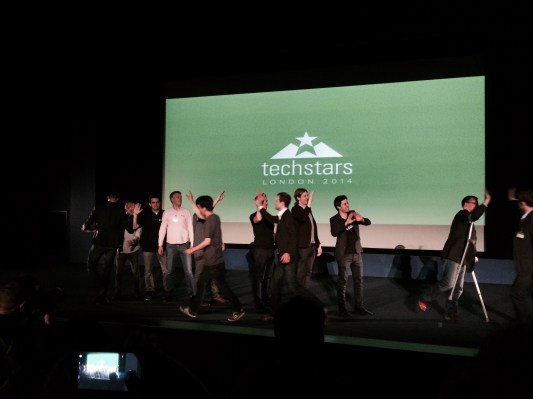Today in an old music-hall-turned-arthouse-movie-theatre in the East End of London, TechStars presented its London DemoDay, three months after the group was announced. The startups presenting ran the gamut from B2B to consumer, education to e-commerce and social networking. Only three of the companies presenting were from the UK, with the rest coming from Europe, U.S. and Asia.
This is the second-ever event after the London edition debuted a year ago. That inaugural cohort has set an impressive track record in terms of fundraising. Jon Bradford, who runs TechStars in London, noted today that in the last year those startups have raised over $23.3 million to date.
Here’s the full rundown of startups presenting. I’d say that all in all I was very impressed with the whole group, which was heavy on people with experience in the field rather than completely green tech newbies.
The main illustration is a pic of them all high-fiving each other after the event and before we moved over to the reception at the TechStars Fintech Accelerator that’s currently in progress nearby. After the event, I chatted with investors to ask who their favourites were, and I’m starring the startups that they and I collectively thought were ones to watch.
In order of presentation:
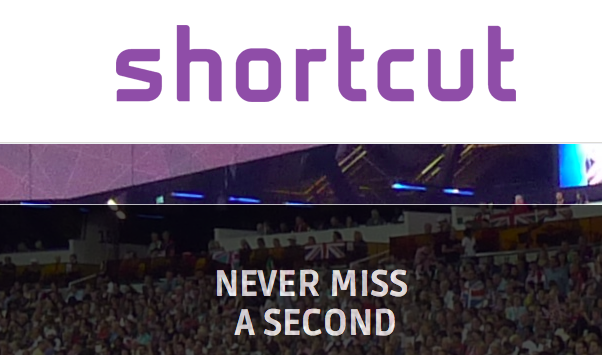
*Shortcut is an app, e-commerce platform and dashboard for event venues that lets customers at the venues pre-order food and other products from their seats. It plays on the idea that lining up to buy beers and food during a game, or buying a t-shirt during a gig, makes for huge lines and annoyed eventgoers who end up spending more time away from the actual event. “Never miss a second,” is the company’s slogan.
Shortcut is founded by Richard Howard and Buford Taylor, respectively Uber’s first-ever employee in London who helped build the company out here, and the third engineer of Eventbrite, a track record speaks to logistical and back-end events experience. Eventbrite co-founder Kevin Hartz is among Shortcut’s advisors.
There are a bunch of other startups coming at the problem of speeding up queues and automating pick up of products from different angels, e.g. Square Order for cafes and restaurants and Tapingo focusing specifically on students at college campuses. And Q App is specifically targeting venues, just like Shortcut.
But as one observer today pointed out to me, “How many times have you seen this kind of service yet at a music or sports venue?” The answer is none, which speaks about the opportunity if they can get the service right.
So far, there are some promising signs with places like London’s Everyman cinema chain, the Oval Cricket Ground and others all using the product, amounting to some 2 million attendees across 100,000 events in the next year. Shortcut today said it’s raising a $500,000 seed round, with $200,000 already committed.

Zzish is an infrastructure as a service for developers to build e-learning apps.
The boom in apps has seen a massive knock-on effect in e-learning-focussed content. McKinsey estimates that the mobile learning market will be with some $38 billion by 2020. Zzish is targeting educational publishers and smaller developers with a platform for building apps for this market more cost-effectively, taking consistent elements in learning apps — testing, scoring, tracking development, progressing through stages and complex levels — and making them into elements that can be repurposed across different subjects, incorporating automated triggers and gamification elements that get people to use the apps regularly.
There has been some measures of Zzish’s platform working: one math leaning app built on the platform to tackle the challenge of kids learning their 12-times tables, saw huge improvements among people who used the app for just 15 minutes each day for six weeks. Companies that Zzish is working with include Pearson education, Memrise, Bel Learning and others.
Charles Wiles, one of the co-founders and the CEO, was Google’s first PM outside of the U.S. and helped build the team that made the first version of Android, and he also has a PhD in artificial intelligence. His co-founder Samir Seetal cut his teeth building platforms at Pearson. It has had £300,000 committed so far in a projected seed round of £500,000.

*Lingvist is an adaptive language learning app that claims to speed up learning a foreign language by up to 10 times. Its promise is that it can help you “learn a language in 200 hours.” To do this, it uses machine learning, a cloud-based “listening teacher”, and “the power of mathematics.” What it seems to do is turn the idea of learning and a user’s responses into a big data analytics play. As CEO and co-founder Mait Müntel explains it, “Every moment spent learning is turned into a valuable insight.”
There are a lot of language learning startups on the market today. This one caught my eye specifically because of the talent that is going into it. Müntel used to work at CERN, where he was involved with the team that identified the Higgs-Boson particle. Other key people at the company hail from Skype, and one of its key investors (it’s already raised a $1.4 million seed round) was also one of the investors in DeepMind, acquired this year by Google.
With the focus for large tech companies like Google, Apple and others on machine learning, I feel that this is one to watch for its talent alone, whether it gets applied to language learning or something completely different down the line.
More on Lingvist here.
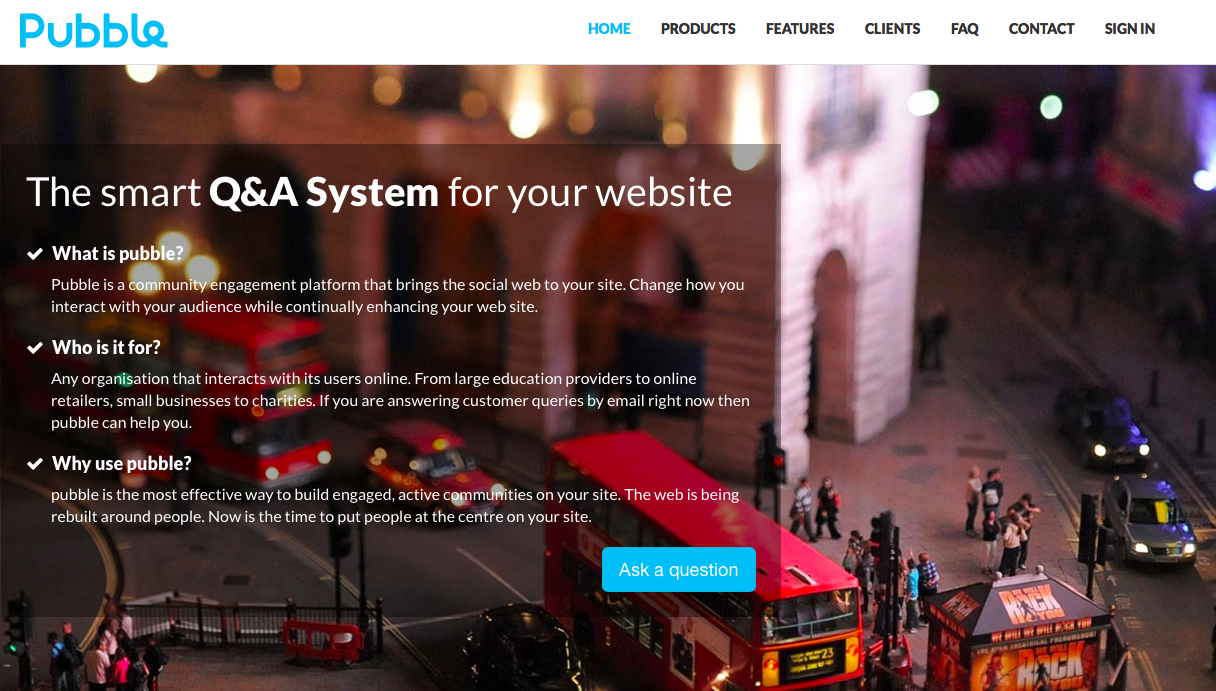
Pubble is a platform that lets you collect and answer customers’ questions. John Dineen, co-founder and CEO of Pubble, says that today its costs business in the U.S. $85 billion, and businesses globally $338 billion, to handle their customer service. The aim of Pubble is to compete against the likes of Bazaar Voice and Lithium to bring the cost to businesses down.
Pubble does this by using algorithms to help businesses answer questions more efficiently. It does this partly through creating what it calls a “knowledge platform” by tapping into previous Q&As, by indexing what’s been asked previously on your own site, or on Twitter, for example. It also provides a dashboard for businesses to track what kinds of questions people are asking and what else they are doing when visiting your site, and a platform for a business to run a live Q&A service. It’s raising €600,000 and has so far had €350,000 committed. It’s also already profitable, I’ve heard.

*Smile Mom is a location-based social network for moms.
John S. Kim, the founder of Smile Mom, sold a company called Paprika Lab to games company GREE in 2012. The turn to social networking came after his wife had a baby and realised she didn’t know many fellow moms in her neighborhood for a support system of people going through the same things she was.
By tying you to people in your local vicinity, Smile Mom, available both on iOS and via Google Play, lets you build a community that you can carry out of the virtual world and into real life, from real-time advice (and sympathy!) meetings over coffee and playdates for the kids.
It’s still very early days for Smile Mom. The app has been launched so far in the UK and Korea, and so far, among those who sign up, one-third of mothers who have signed up have continued to use it into later months. Last week, the sign up rate was 50,000 users, and Kim says monthly active users have passed 22,000 at the moment.
As a parent to young kids myself, I can very much see the appeal of this app. The early days of being a parent can be unnerving and lonesome, and even if you have help from your own parents, your partner or (if you have the means) professionals that you’ve called in, it’s reassuring to speak to other people in your same position.
In the UK, there are of course dozens of forums online like Netmums that offer help as well but having this based around your community, and the subsequent potential of taking those relationships offline, is a very appealing idea. (And one U.S. investor I talked to, who pointed out there aren’t many antenatal or community groups over there in the way that you get in the UK, enthusiastically agreed.)
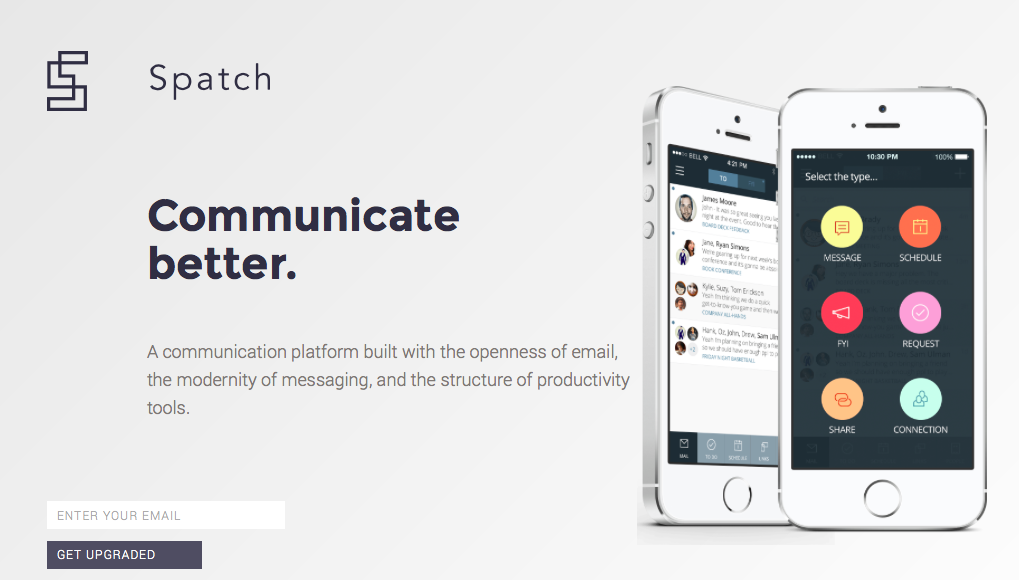
*Spatch. “Revolutionizing email as you know it.” The CEO and co-founder, Mick Hagen, already has a notable exit under his belt: he sold Zinch, a social network for high school students, to Chegg for $45 million. Now, Hagen is tackling the enterprise market. The company estimates that there are some 70 trillion emails in the world (half of which are in my inbox). Spatch originally wanted to build an email client to try to tackle that, but ended up, to tackle the problem more comprehensively, creating what Hagen describes as “an entire communication protocol.”
What Spatch does is analyse the content of an email message and surfaces the things that require actions. These come up as highlights and also buttons at the top of the email. You can tap on them to move to other applications like you calendar or another app, and usefully the recipient doesn’t need to also have Spatch to see the actions, if you’ve composed the email within Spatch yourself.
The service is backwards compatible with past email, which is a neat and useful feature.
This is not the first company that I’ve seen looking to tackle email automation — although a lot of it has been more around intelligent filtering (Gmail, Mailbox) and linking up email with a “personal assistant” action (e.g. Amy from X.ai). Notably, Hagen says that Facebook, SwiftKey CityMapper, Virgin, SkyScanner and others have all signed on.
Other co-founder Ryan Johnson helped build the platform at Zynga, and among its advisors is the founder of Sparrow, the mobile e-mail client acquired by Google. “We’re trying to get him to actually join the team,” Hagen said enthusiastically.

Good Audience is a social engagement platform that incorporates things like content recommendation to drive more fans to a brand and users to services. Sitting in the same general category as Radian6 and HootSuite, Good Audience is as much of an engagement platform as it is a kind of “how-to” for companies who are trying to get more people through social networks. It uses algorithms to look at a company’s current audience to create suggestions for what to do to grow it. This is around not just timing of posts, but what to post, with ways to break out particular demographics and to geo-target your messages. CEO and co-founder Sherman Lee says that there are some 300 beta customers “dogfooding” the app now. It’s raising $400,000.

Proximus is a startup in the business of helping brands and retailers track consumer data in-store, literally showing where customers go in the store and what they do.
There are mainly three different approaches today to solve this. The first through the issuing of loyalty cards and then tracking how people spend money, although this is less effective with in-store behaviour.
The second is WiFi and using smartphone signals, which is imprecise and unable to see the actual path a user takes through the store.
The third are iBeacons, but apart from these still not being that ubiquitous, a user needs to download an app, have the appropriate handset, accept permissions and so on. So a lot of hurdles before you can see mass-market usage.
Into the lacuna steps Proximus. Like iBeacons, it also uses Bluetooth LE but it puts its chips directly on to baskets and trolleys. This makes the data it picks up 20 times more precise, letting retailers track where users go in stores as well as where they stop and what they buy. Proximus then plots this all in a dashboard that includes stats akin to heat maps. This can be used by stores to optimise the layout, measure the success of different promotional campaigns, and so on. It’s also useful, I’d point out, at a time when individual consumers may be less keen to have additional ways of being tracked directly. Since the tech is on your cart and not your own possessions, there is a degree of anonymity to the process.
Proximus has trials with Carrefour, the huge European supermarket chain, as well as with Nisa, to tackle what it estimates is a £176 billion opportunity in retail. They are raising €300,000 with €100,000 committed so far.

Magnific‘s CEO Vincent Dignan tells me it is not a content farm because “we work with writers to make their writing better.” What it is is a network of over 750 writers among (only!) five editors, which it produces for its own sites (the most notable of which is called Planet Ivy), as well as those of clients that it works for. “Learn how to create great content and how to get it seen” is the company’s mantra. The tech element here is that Magnific claims that it’s created a platform that helps edit the writers and match their work with sites for publishing. “We believe that we can scale like a software company,” he says.
It claims 17 million page views across all of the various sites they work with so far. Today, the company isn’t looking for investment, just strategic partners, which would pay Magnific for writing. “My obsession is content,” Dignan says.

*Avuba. Coming out of Berlin, Avuba is a mobile-first banking account, disrupting the very turgid, slow moving space of financial services. Jonas Piela, the CEO, says that currently it takes 20 clicks to open a mobile bank account right now. “Banks can’t do online,” he says. Avuba says the same can be done instantaneously using its app, and at a far smaller cost. In addition to opening an account and then keeping your money there, Avuba has other features like transferring money, paying regular bills, as well as a tracker to let you see how you are spending your money. By the end of this year it plans to integrate credit card services, mortgages, pensions, insurance, loans and international transfers.
So far, Avuba says that 80% of people who download app complete sales process, and 46% users are active. One fin tech specialist (not an investor in Avuba) I talked to today was extremely enthusiastic about this one. “I think they are really on to something here,” he said. More on Avuba here.
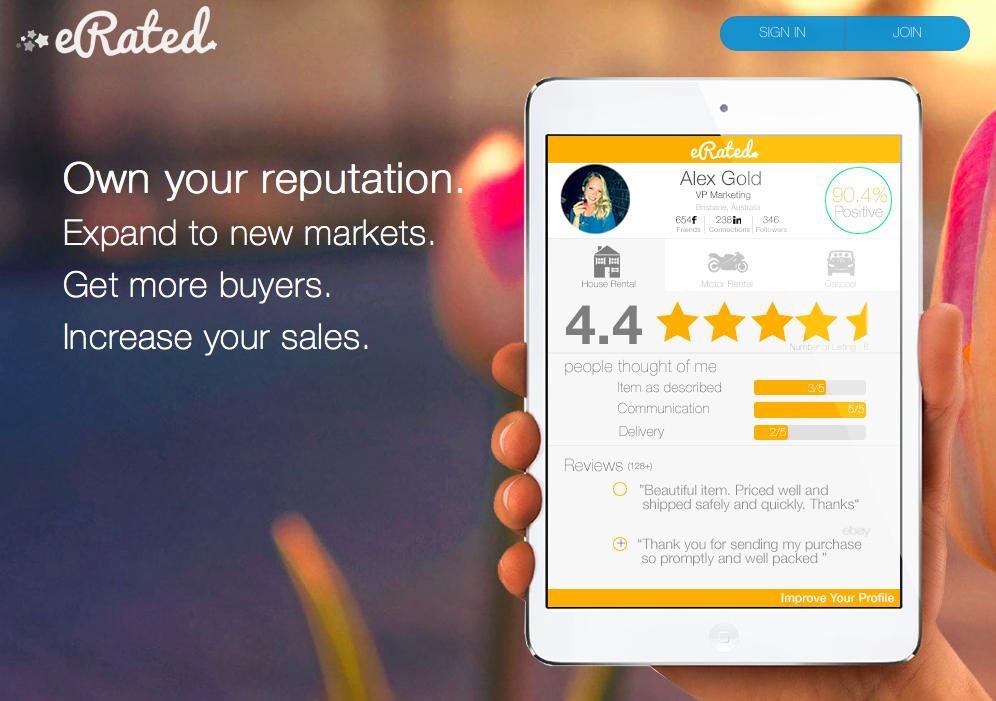
*eRated is a credit scoring solution for P2P transactions tackling a large, fragmented market of an estimated 100 million sellers across some 1,000 marketplaces worldwide, totalling some $460 billion.
Today, some 90% of online merchants appear in more than one market. Tapping into the belief that a user with more good ratings is more trustworthy than one with only a few good reviews, the idea behind eRated is that it lets a merchant selling online to connect its accounts across different marketplaces so that all of the data that he amasses for sales in those different marketplaces appears in one place.
This includes not just transactional data but social data — in other words, how that merchant is “rated” across different marketplaces.
“This lets a merchant build trust with buyers, which helps increase conversions and drive sales,” CEO and co-founder Boaz Cohen notes. He claims that those who are already using eRated to converge their ratings across sites are seeing conversion rates of 10%. “In e-commerce, that kind of conversion rate is pure gold,” he says. It’s also not something that is readily available today, it seems.
The company released a plug-in a few weeks ago and is already being trialled by eBay.
